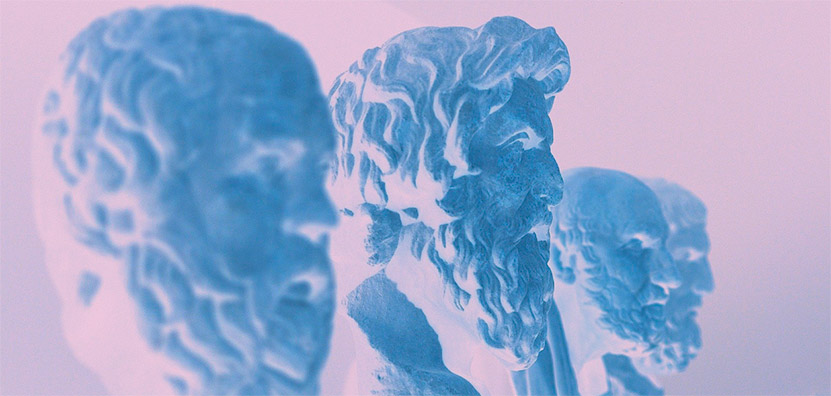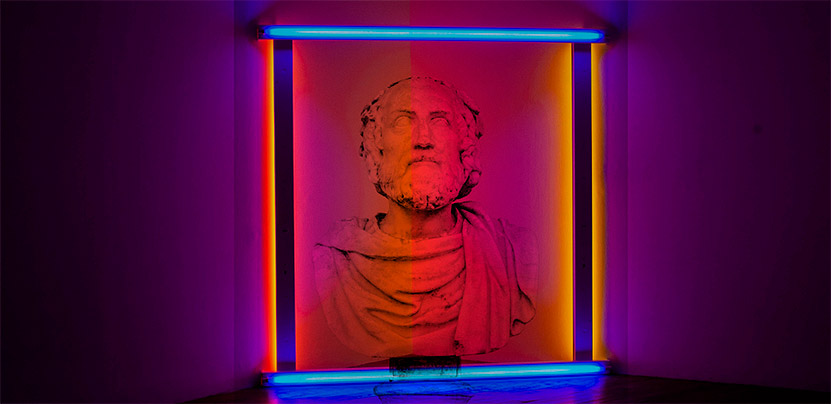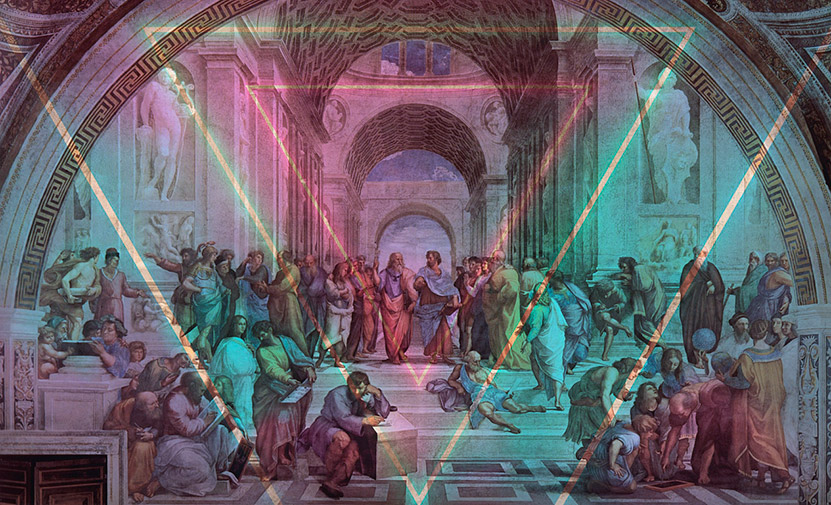Think
The 5 Greek philosophers you should know about
Salomea Slobodian, alumni of the double degree in Philosophy and Journalism Degree
and current doctoral student in Philosophy at the University of Navarra, invites us to reflect on the
us to reflect on the current relevance of the thought of the great philosophers of antiquity.
of the great philosophers of antiquity.

14/09/20: European and US astronomers detect a foul-smelling gas on Venus that on Earth is a sign of life and raise the possibility of organic life on this neighbouring planet.
c. 624 BC: the astronomer and practical scientist Thales of Miletus is born. Observing the stars and their influence on the Earth, he asks himself what is the underlying principle of the material universe, what is the basis of all life, organic and inorganic.
Thales was the first to inquire into the ultimate and fundamental nature of the world, from which the multitude of things and phenomena of the universe, which are but changing forms of an ultimate element, develop.
Hence he is considered the first "natural" philosopher: according to him, philosophy is about understanding the plurality that one experiences in one's daily life through the senses, about its existence and nature.
Such an understanding lies in the finding of an all-embracing unity, the unity of a diversity that springs from the underlying first principle(arhé), which is, Thales thought, water.
03/09/20: Filmmaker Christopher Nolan releases in the US the film Tenet, a time-reversal thriller about the possibility of saving humanity's future by changing its past from the present.
540 BC: Heraclitus of Ephesus is born and reflects on the changing nature of things, immersed in the temporality of existence. Heraclitus would have disagreed with Nolan, because he argued that "it is impossible to step twice into the same river, for those who step into it plunge into waters that are always different" (H. Diels-W.Kranz, Fragments of the Pre-Socratics).
According to the philosopher, nothing remains on earth, nothing is stable, and everything is a continuous tension of diverse modes of being that in their totality make up the unity of the One. Reality is one, but it is multiple at the same time, and such multiplicity is essential to it.
Existence thus presents an identity in difference, which is compared to fire. Just as fire persists by consuming the heterogeneous subject transforming it into itself, the One springs from the multitude of objects without which it would not exist and transforms them into different states of the subject being its essence.
Thus, while the substance of each material object is always changing, the total quantity of the subject remains the same.
 03/09/20: squatters denounce a homeowner who managed to recover his house in Barcelona after being forced to spend months, together with his family, outside his own home.
03/09/20: squatters denounce a homeowner who managed to recover his house in Barcelona after being forced to spend months, together with his family, outside his own home.
399 BC: Socrates dies in Athens, unjustly condemned, with the certainty that "it is better to suffer injustice than to commit it" (Plato, Apology of Socrates), because right action provides a real benefit for human beings, giving them a permanent and greatest good, happiness.
Socrates had a special interest in ethics and considered it his mission to train men in values so that they would take care of their souls, which according to the philosopher is the noblest possession of the human being that grows in wisdom and virtue.
For Socrates, unjust action does not stem so much from moral weakness as from ignorance: knowledge and virtue are identified, because he who knows what is right acts rightly.
At first glance, such a statement may seem untenable, but the thinker explains that no one chooses to do evil for evil's sake, but always seeks a good (e.g. the thief steals to get money or to feel the pleasure of revenge, etc.). But such goods are transient and mediocre, they are not capable of fulfilling the soul of the human being, of making him happy.
That is why it is the wise man who realises the advantages of self-mastery, without indulging in small pleasures which may satisfy needs without ever proving sufficient. Pleasure, of course, is a good, but the true pleasure that lies in lasting bliss is achieved by a moral rather than an immoral man, because he watches over his soul, capable of true and full bliss.
28/09/20: Hundreds of plus-size women parade under the Eiffel Tower to demand more diversity in the fashion world and its standards, on the occasion of Paris Fashion Week 2021.
c. 427 BC: he was born Platothe great Athenian philosopher who raised the question of the objectivity of beauty. Plato states emphatically that beauty itself is something objectively real, but only exists outside of things Materials.
Everything we call beautiful is not beautiful insofar as it participates in the Beautiful itself, which it approaches to a greater or lesser extent, but always with a mixture of ugliness in comparison between one thing and another.
That is why the absolute Beauty and source of all participated beauty cannot be an object or a beautiful subject, whose materiality admits Degrees of beauty. This, on the other hand, in its purity is the object of the intelligence, which in contemplating beautiful things is capable of ascending towards its ultimate source , the Idea of the Beautiful.

21/09: The 71st anniversary of the United Nations is commemorated. Its University Secretary Antonio Guterrez calls for preserving the longest period of peace among the world's great powers, recalling that "it took two world wars, millions dead and the horrors of the Holocaust for world leaders to commit to international cooperation and the rule of law".
384 BC: the Stagirite Aristotle was born, who postulated that the State exists for a purpose: to procure the supreme good of the human being, his moral and intellectual life, which can only develop under a political system that preserves peace and provides citizens with the necessary goods Materials .
Aristotle argues that only in the state, the polis, can man live in full happiness. Because the human being "is a political animal by nature" (Aristotle, Politics), it is in the society of inter-human relations that he develops fully.
The philosopher insists that to achieve this ideal, the state must opt for a political regime that seeks a balance of freedoms and responsibilities in order to preserve justice. Any imbalance causes good systems to pervert: monarchy drifts into tyranny, aristocracy into oligarchy and polytheia drifts into its perverted form, democracy, the system of revolutions and socio-political chaos.
The importance of measure in Aristotelian thought is crucial: it is at the core of the definition of justice, the virtue that is at the basis of the polis. The Stagirite understands justice as equitable, as giving to each his due.
Hence, the modern terms "right" and "duty" have been understood since Aristotle as essentially political concepts: they can only exist in a society regulated by positive law, which pursues social justice.
This is why the philosopher would find the notion of "human rights" contradictory, for example, since it does not concern the question of justice. As one person cannot owe another person his life, food, education, etc., neither can the state demand them from him by imposing a law.

Background vector created by pikisuperstar - www.freepik.es
What is the importance of philosophy today?
It is well known that historical knowledge is essential to understand and reflect on the events of the present and to develop the critical spirit that helps an educated person to cope in today's society.
But if we maintain that it is important to learn about the great conquerors and the evolution of peoples, it would be illogical to remain ignorant about the great creators who have contributed to the development of culture and who have tried to answer the questions that everyone is asking today .
To go back to the beginnings of European thought, then, we must look to the Hellenic world, whose ideas transcend thousands of years and shed light on today's issues.
Wait for it! You may also be interested in...






